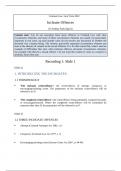Criminal Law: Lent Term 2022
Inchoate Offences
Dr Findlay Stark (fgs23)
Content note: You do not nowadays learn many offences in Criminal Law with clear
circumstance elements, and many of those circumstance elements are usually not particularly
important in real cases: eg most murder cases do not involve any discussion of whether the
deceased was a human being. The clearest, practically important circumstance element you
learn is the absence of consent in the sexual offences. It is for that reason that, when I need an
example of difficulties that arise when inchoate offences encounter circumstance elements,
my example will often be a sexual offence. I do not want this content to come as a surprise to
anybody, hence this note.
Recording 1: Slide 1
[Slide 2]
1. INTRODUCING THE INCHOATES
1.1 TERMINOLOGY
‘The inchoate crime/offence’: the crime/offence of attempt, conspiracy or
encouraging/assisting crime. The perpetrator of the inchoate crime/offence will be
referred to as D.
‘The completed crime/offence’: the crime/offence being attempted, conspired towards,
or encouraged/assisted. Where the completed crime/offence will be committed by
someone other than D, the perpetrator will be referred to as P.
[Slide 3]
1.2 THREE INCHOATE OFFENCES
Attempt (Criminal Attempts Act 1981, s 1)
Conspiracy (Criminal Law Act 1977, s 1)
Encouraging/assisting crime (Serious Crime Act 2007, ss 44-46)
,Nb You need to draw a clear distinction between encouraging/assisting an offence (which is
a form of principal liability for an inchoate offence) and aiding and abetting a completed
offence (which is a means of becoming a secondary party to a completed offence – see next
lectures).
[Slide 4]
1.3 ISSUES TO BEAR IN MIND
At what stage should the criminal justice authorities be able to intervene?
Alec Walen, ‘The Doctrine of Illicit Intentions’ (2006) 34 Philosophy & Public
Affairs 39-67
Stefanie Bock and Findlay Stark, ‘Preparatory Offences’ in Kai Ambos et al (eds),
Central Issues in Criminal Law and Criminal Justice (2020) 54-93
[W]e assume that the further away from the commission of a completed offence -ing is, the
more difficult it is to justify criminalising -ing as a proportionate response. We call this the
‘Proportionality Principle’. The Proportionality Principle is closely linked to traditional ideas
of justice and state self-restraint. In a nutshell, it forbids the state to go beyond what is
necessary and appropriate to achieve a certain (legitimate) objective. By requiring a careful
balancing of competing values, the Proportionality Principle restrains government action and
prevents the state from excessive interventions into the personal freedoms of its citizens. The
Proportionality Principle may thus be regarded as a cardinal principle for any state action. It
does not, however, reveal clear and definite limits on particular types of state conduct such as
the criminalisation of preparatory offences – rather, the details have to be developed within
the framework of a comprehensive balancing exercise taking into account in particular the
aims of the criminal law and the rights enjoyed by citizens.
At 54-55 (footnote references omitted)
[-ing = a generic act. In concrete cases it could be displaying a sign that could encourage
others to commit crime, giving someone a knife, urging someone to commit a crime, etc.]
For critical engagement with Bock and Stark, see Miriam Gur-Arye, ‘Boundaries of Criminal
Liability: Participation in Crime, Preparatory Offences and Omissions’ (2020) 53 Israel Law
Review 392-408, 398-403.
Which forms of mens rea are acceptable for use in the inchoate offences?
The ‘remoteness principle’: Jeremy Horder, Ashworth’s Principles of Criminal
Law, 9th edn (2019)
2
,[I]nchote crimes are an extension of the criminal sanction, and the more remote an offence
becomes from the actual infliction of harm, the higher the degree of fault necessary to justify
criminalization.
At 515
What role should (legal and factual) impossibility play in the inchoate offences?
Legal impossibility: what D encourages/assists, conspires to do, or attempts to do is not,
in law, a crime (eg posting chocolates to Scotland).
Factual impossibility: what D encourages/assists, conspires to do, or attempts to do
cannot, in fact, result in the commission of the completed crime/offence in the
circumstances (eg the intended victim is, unbeknownst to D, already dead).
How should we punish inchoate offences?
The question of punishing inchoate offences, and the importance of luck in determining
desert, is discussed in Andrew Ashworth, ‘Taking the Consequences’ in Stephen Shute et al
(eds), Action and Value in Criminal Law (1993) 107-124.
End of Recording 1
3
, Recording 2: Slide 5
[Slide 6]
2. ENCOURAGING OR ASSISTING CRIME (SERIOUS CRIME
ACT 2007, SS 44-46)
See, generally, David Ormerod and Rudi Fortson, ‘Serious Crime Act 2007: The Part 2
offences’ [2009] Criminal Law Review 389-414.
2.1 WHAT WAS WRONG WITH THE OLD LAW OF INCITEMENT?
J.R. [John] Spencer, ‘Trying to Help Another Person Commit a Crime’ in Peter
Smith (ed), Criminal Law: Essays in Honour of JC Smith (1987) 148-169
Serious Crime Act 2007
59 Abolition of common law replaced by this Part
The common law offence of inciting the commission of another offence is abolished.
Nb some forms of (common law and statutory) incitement survive, but are not on the
syllabus.
[Slide 7]
2.2 THE SCA 2007 OFFENCES: AN OVERVIEW
The ‘Intentional Offence’
Serious Crime Act 2007
44 Intentionally encouraging or assisting an offence
(1) A person commits an offence if
(a) he does an act capable of encouraging or assisting the commission of an offence; and
(b) he intends to encourage or assist its commission.
(2) But he is not to be taken to have intended to encourage or assist the commission of an
offence merely because such encouragement or assistance was a foreseeable consequence of
his act.
The ‘Belief-based Offence’
Serious Crime Act 2007
45 Encouraging or assisting an offence believing it will be committed
A person commits an offence if
(a) he does an act capable of encouraging or assisting the commission of an offence; and
(b) he believes
(i) that the offence will be committed; and
4




